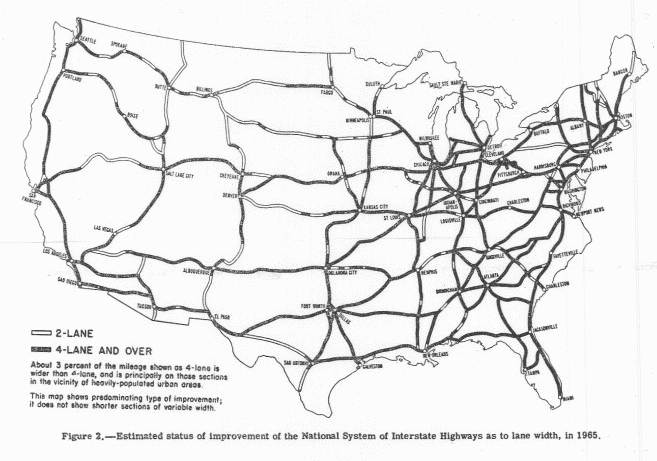U.S. on Highway to Flunking Out
Roads are crumbling, bridges are collapsing, and what was once considered one of the greatest achievements of any government anywhere has fallen into embarrassing disrepair.
Bloomberg, April 23, 2014
Roads are crumbling, bridges are collapsing, and what was once considered one of the greatest achievements of any government anywhere has fallen into embarrassing disrepair. I am of course discussing our nation’s infrastructure. Last year, the American Society of Civil Engineers gave the U.S. infrastructure a D+.
When it comes to the most basic functions of government we barely get a passing grade.
How did this happen? Credit a combination of benign neglect and anti-tax ideology run amok.
The Revenue Act of 1932 created the U.S.’s federal gasoline tax, charging 1 cent a gallon. Three decades later, President Dwight D. Eisenhower signed the Federal Aid Highway Act of 1956.That created one of the world’s great transportation networks, the interstate highway system, at an inflation-adjusted cost of about a half-trillion dollars. ( See the History of the Interstate Highway System for more details.)

Each section of highway was subsequently gifted to the state where it was located. The maintenance for this sprawling system of roads, bridges and tunnels is paid for through a combination of federal and local revenue. According to the Federal Highway Administration, about 70 percent of the regular maintenance costs and 80 percent of the capital funding is paid for by federal gas taxes, with state and local municipalities covering the rest.
It has been a great success. Unlike temporary measures whose stimulus impact expires when the measures do — think of temporary tax cuts or extensions of unemployment insurance — the highway system continues to pay dividends.
The multiplier effect of this national investment has been enormous. It has allowed goods and people to move freely around the country, helping the economy expand for more than a half-century.
These economic gains are in danger. Since 1993, the U.S. federal gasoline tax has been 18.4 cents a gallon, which finances the Highway Trust Fund. Adjusted for inflation, the tax is now about 10 cents a gallon. Unlike most user taxes, it isn’t indexed to inflation. As costs for repairs have increased, revenue to pay for ordinary preventative maintenance and repairs has failed to keep pace.
The U.S. interstate highway system, once the envy of the world, is in mediocre and deteriorating condition today. The states have no room in their budgets to cover the shortfall. About half of the states have gone 10 years or more without any increase in their own gasoline taxes as well.
A proposal to raise the tax 15 cents a gallon was introduced in the fall, but it has gone nowhere.
I am at a loss to explain the opposition to this. Regardless of your views on income, corporate or estate taxes, this is simply a user tax. The more you drive on roads, the more you pay in gasoline taxes. Some people may feel like they are over-taxed, but not when it comes to gasoline. The U.S. has the third-lowest gas taxes in the world. Only Kuwait and Saudi Arabia are lower.
The lack of maintenance in our transportation grid is putting the U.S at a competitive disadvantage. The U.S. once led the world in infrastructure development. We have now fallen to 15th in infrastructure as China and India leapfrog us. Both invest as much as 9 percent of their gross domestic product in infrastructure construction and maintenance. In the U.S., we now spend less than 2 percent of GDP on such projects. Our system is so old and decrepit that we should be running much closer to those nations in terms of spending.
Even worse than not approving an inflation-indexed gas tax, Congress has actually been raiding the transportation pantry. During the recent budget battles, Congress borrowed $34.5 billion from the Highway Trust Fund to make up for federal funding shortfalls. Perhaps worst of all, the deferral of basic maintenance is creating greater costs for repairs in the future, which might run as high as $100 billion a year.
The solution is simple. Raise the federal gasoline tax five cents a year for the next five years. Index it to inflation starting in the fifth year. It’s the least the U.S. can do to keep up.
Originally U.S. on Highway to Flunking Out


What's been said:
Discussions found on the web: